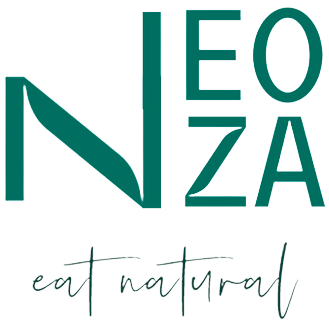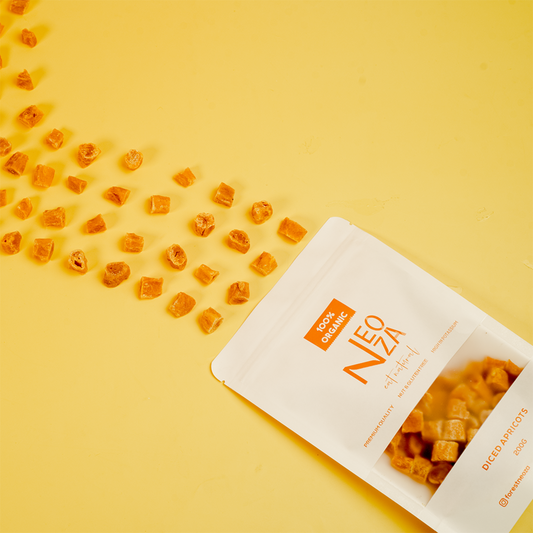-
Diced Dried Apricots (Khubani) – Fresh & Organic
Regular price From Rs.350.00 PKRRegular priceUnit price / per
Collection: Fresh Tasty Dried Apricots in Pakistan
Discover the authentic taste of diced apricots, known locally as dried khubani or khoobani — a nutritious treat loved across Pakistan. Grown in the rich orchards of the Western Himalayas, Neoza apricots are carefully harvested at peak ripeness and naturally dried to preserve their sweet flavor, vibrant nutrients, and mountain-fresh aroma.

Before you buy, you can always check the 1 kg diced apricots price in Pakistan or compare the dry apricot price per kg in Pakistan — we keep our rates consistent nationwide, whether you’re in Karachi, Lahore, or beyond. Many customers also search for the fresh apricot price per kg or the dates price in Pakistan — we’re proud to offer premium dried fruits with full transparency and fair pricing.
Why NEOZA Diced Apricots Stand Out
Mazaydaar aur Khushbodaar
Each bite of our dried apricots (dried apricots in Urdu: khubani) delivers a naturally sweet, fragrant taste that stands out from ordinary options.
Sehat-Bakhsh Khana — Dry Apricot Benefits
Dry apricots are loaded with vitamins, minerals, and fiber that aid digestion, boost immunity, and support heart health. They’re packed with dry khubani benefits and are a tasty, wholesome alternative to processed snacks.
Supports Wellness — Dried Apricots in Pregnancy
Dried apricots are often enjoyed during pregnancy for their natural iron, fiber, and energy boost. Still, always consult your doctor for personal guidance.
Pure & Chemical-Free
We follow organic-friendly practices so your dry apricots arrive free from harmful additives, keeping each diced piece safe and naturally flavorful.
Clear Pricing
Looking for the latest dried diced apricots price in Pakistan? Our transparent system keeps the apricot price in Pakistan clear for every pack size — small or bulk.
Always Fresh
Our sealed packs lock in taste and freshness. Store them easily at room temperature or refrigerate if needed.

Ways to Enjoy
- Breakfast Boost: Top your oatmeal or yogurt for a quick morning lift.
- Healthy Snacking: Ready-to-eat diced pieces save time — just open and enjoy.
- Baking & Recipes: Add sweet, fruity notes to muffins, halwa, or homemade granola.
- Savory Meals: Mix into rice dishes or salads for a sweet-savory contrast.

Storage Made Simple
- Keep diced apricots in a sealed, airtight container.
- Store in a cool, dry spot away from moisture.
- For long-term storage, refrigeration helps preserve texture and taste.
Nationwide Delivery — Hassle-Free
No matter where you live, you get the same fair dry apricot price per kg in Pakistan — from a single pack to a family-size 1kg diced apricots pack.
Place your order online, choose your size, and we’ll deliver fresh diced apricots to your door — all at a fair price. Our customers trust us for clear pricing, whether you’re comparing fresh apricot price per kg, other dried fruits, or even the dates price in Pakistan.
Ready to Order?
Experience the best of Himalayan dried diced apricots — nutritious, naturally sweet, and always pure. Shop today and enjoy the many dry apricot benefits and dry khubani benefits in every bite.
FAQ's
What is the price of apricot in Pakistan?
The price of apricot in Pakistan depends on quality and type. At NEOZA, our premium diced apricots start at 350 PKR for a 40g pack, 1150 PKR for 200g, and 5750 PKR for a large 1kg pack (5 × 200g) — always fresh and consistently priced across Pakistan.
How much is 100g of dried apricot?
While we don’t sell an exact 100g pack, our 200g pack is 1150 PKR, so 100g would be around 575 PKR, based on our consistent dry apricot price per kg in Pakistan.
How much is 30g of dried apricot?
Our smallest pack is 40g for 350 PKR, so a 30g portion would cost slightly less — a great choice if you want to try our premium diced khubani before buying more.
Why are apricots so expensive?
Premium Himalayan apricots are hand-harvested and naturally dried, which concentrates flavor and nutrients. This extra care means the dried apricots price in Pakistan is higher than fresh apricots — but you get pure, chemical-free fruit with all the health benefits.
What is the price of dried apricots in Pakistan?
At NEOZA, our fixed dried diced apricots price in Pakistan is:
- 40g: 350 PKR
- 200g: 1150 PKR
- 1kg (5 × 200g): 5750 PKR
No hidden charges — you pay the same price nationwide.
What is the price of dry apricots?
The dry apricot price per kg in Pakistan can vary, but with us you get a clear, fixed rate: 5750 PKR for 1kg diced apricots, with smaller pack options too.
What is the price of 1kg khubani?
You probably mean 1kg khubani — our top-grade diced apricots (dry khubani) cost 5750 PKR per kg.
What are the dry apricot benefits?
Dry apricots are loaded with antioxidants, fiber, and vitamins that aid digestion, strengthen immunity, and boost energy. These are the dry khubani benefits that make them a smart, healthy snack.
What is the fresh apricot price per kg in Pakistan?
The fresh apricot price per kg varies seasonally but usually ranges from 300–500 PKR, while premium dried apricots hold value year-round.
How does the dates price in Pakistan compare?
Dates are often priced lower than premium dried apricots, but both are natural, wholesome snacks. If you’re comparing the dates price in Pakistan with our diced apricots, remember that drying concentrates nutrients and flavor, adding value.


